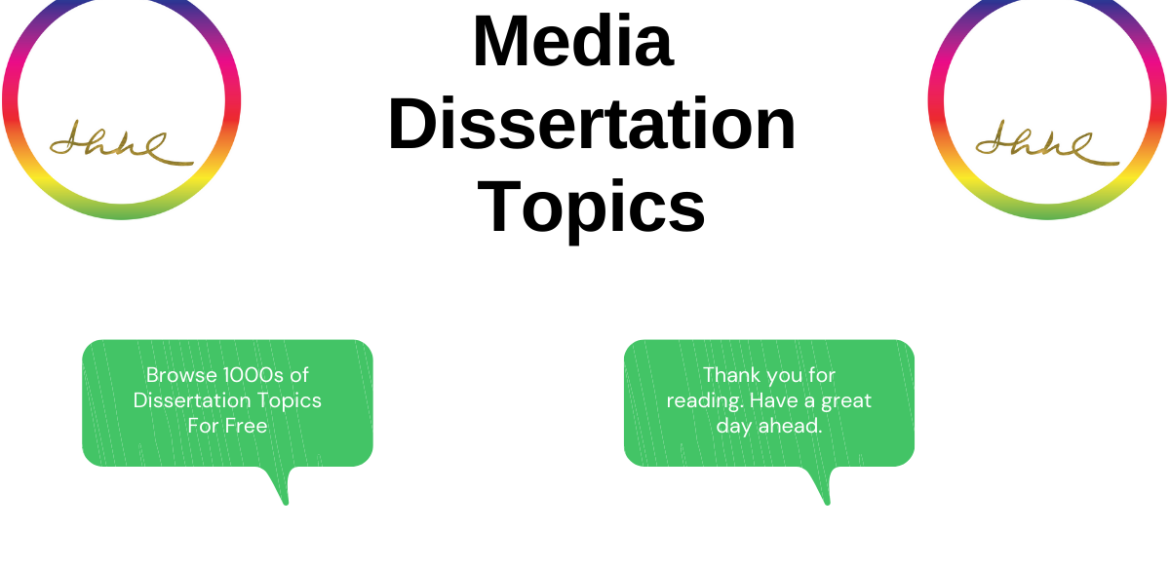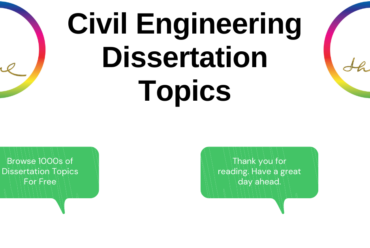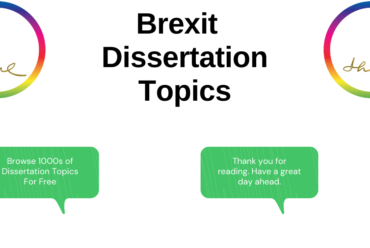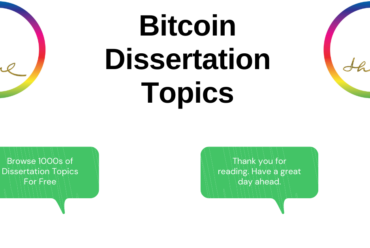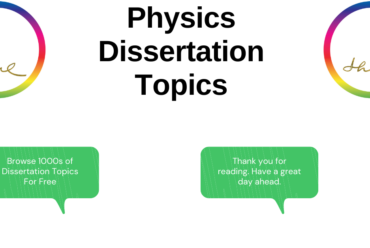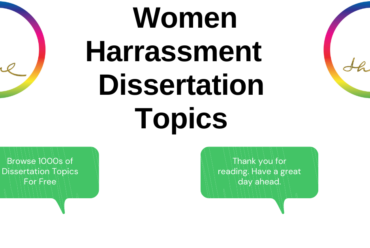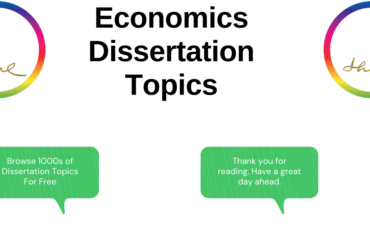Media Dissertation Topics
When writing one of these projects, the objective is to create a dissertation or thesis on a clearly defined subject. It can be challenging to prepare a dissertation when the student lacks a well-defined research topic. This means that in order to create an excellent dissertation, you must first select a topic and then do research to develop a well-defined thesis statement. A well-defined research question is crucial because it keeps the dissertation on track and fluid, while also helping students to illustrate the relevance of their study topic. Students should choose media dissertation themes that pique their interest and provide a fresh perspective on the subject. A dissertation is not a doctoral dissertation, and it is not intended to transform the field of research; rather, dissertations are intended to provide a new and diverse perspective on existing research and literature. Thus, a media dissertation topic should have sufficient literature to enable students to develop their own distinctive arguments. The following article includes numerous excellent media dissertation themes and research questions to aid students in determining an area of interest and formulating an effective research question. The following article discusses many media dissertation topics, including journalism, mass communication, and music. This page proposes a variety of media dissertation themes in the areas of free expression, censorship, culture, communication, government surveillance, and social media, as choosing a media dissertation topic can be challenging.
Editingarsenal has compiled a list of some of the most popular and common dissertation topics from a variety of academic disciplines, so you can pick and choose what to write about. If you need dissertation editing assistance , don’t hesitate to contact one of our qualified and experienced editors and proofreaders.
Media and Censorship Topics
- Media censorship is the practice of prohibiting journalists from publishing articles on the grounds that they are deemed offensive, harmful to society, delicate, politically wrong, or otherwise problematic by government institutions or the general public. If you wish to exert control over the media for social good, you must employ censorship. Are these actions legitimate, or are they only a means by which the government can increase its control over its citizens? There are two sorts of censorship: direct censorship, which involves the prohibition of specific media or topics, and propagandist censorship, in which media and artists promote the government’s viewpoint through their work. The following are some dissertation themes in this contentious field:
- Direct censorship is the most egregious violation of a person’s human right to freedom of expression. Discuss the UNDHR.
- Despite journalists’ moral obligation to present the news honestly, many individuals believe the media is biassed toward one political party or another. In the United States, the Fox News Channel serves as a case study.
- Iran’s media outlets are currently subjected to a rigorous censorship regime. Is this a plan that protects the country’s integrity, or is it a means by which the government retains power?
- Was the UK and US governments’ release of information on Iraq before to the war an example of effective propaganda, or was it a one-off?
- A comparison of several viewpoints on the restriction of pornography in a free or democratic society: Is this censorship?
- When a concern to national security exists, such as in the Spycatcher Case, English courts will permit censorship. Should the scope of valid whistleblowing be restricted, and at what point does it become a crime?
- Art has historically been censored in order to sustain social norms. Even though some believe the BODYWORX art exhibition is immoral, it has not been prohibited on that basis. What is the difference between this and contentious art such as displayed foetuses?
- In a democratic society, propaganda-based censorship appears more subversive when concealed behind ostensibly valid regulations. A case in point is the war against terrorism.
- Political correctness has become the new censorship in democracies. Is it possible that the liberal tolerance mindset has resulted in a violation of the same rights it pretends to protect?
- Due to recent court rulings addressing an individual’s ability to wear religious symbols, it is uncertain whether the United Kingdom is now restricting religious freedom in the country. The issue here is whether this is an example of censorship or not.
- Violence, scandals, and other contentious topics are often banned. Is a compromise between the need for censorship and the desire to convey the truth possible?
- Consider the tight standards that control censorship: What is the Arab world’s capacity for artistic dissemination in the face of censorship?
- Theories of censorship concealed in plain sight Is there censorship law in the United States and the United Kingdom that creates unfavourable conditions for journalists, compelling them to self-censor in order to escape prosecution?
Journalism and Freedom of Expression Topics
- The press and journalism provide a forum for the expression of diverse opinions. Protecting individuals’ privacy, however, comes at the expense of the media’s critical function as the public’s watchdog. As a result, journalists play a critical role in society at the global, regional, and national levels. Individuals in these positions are protected under the right to freedom of expression. We’ll discuss how courts can protect journalists and how to avoid court in this part. The following are some examples of prospective dissertation topics in the field of media:
- Reynolds v. Time Newspapers established the press’s duty as a watchdog for the public in a historic decision. Is this case likely to have an effect on how courts regard journalists in the future?
- Journalists rely on sources in every aspect of their work. Should the laws protecting free speech be invoked to protect sources who may have violated confidentiality?
- The United States Constitution’s First Amendment safeguards for free speech and the press are a cornerstone of the country’s media environment. Should the United Kingdom take a cue from them?
- Is there any justification in a democratic society for infringing a journalist’s right to free expression?
- According to this idea, free speech and a free press are necessary components of a democratic society.
- A comparison of UK and US citizens’ attitudes on press freedom.
- While journalism is founded on free speech, does that give journalists the licence to wreck people’s lives? A discussion of the fine balance that must be achieved between accurate reporting and good journalism.
- Concerns have been raised concerning the ethics of numerous media outlets’ “name and shame” techniques. What are your thoughts on this strategy? Does this weaken or increase their duty as the public’s watchdog?
- Watchdog is a key initiative for consumer protection. Is this a case of ethical journalism?
- While a breach of confidence is a significant aspect that violates the Data Protection Act and regulations, how far can the journalist’s right to freedom of expression be cited to justify such a violation?
- Do tabloids and broadsheets have varying degrees of editorial freedom? The Sun and the News of the World are pitted against one another.
- Citizens of the United Kingdom have a negative right to freedom of expression under common law. Are there any implications for the country’s journalism?
- The UK v. Sunday Times case highlights how courts restrict journalists’ freedom of expression. How can courts secure the protection of journalists?
- The right to freedom of expression is guaranteed in Article 10 of the Human Rights Convention. Is it feasible for journalists to benefit from this new legislation?
Journalism and Privacy Topics
- Journalism and privacy have arisen as popular media dissertation themes, particularly in the rising world of celebrities and the developing age of everyone being current on global events. As journalism has highlighted concerns about privacy vs open journalism, it has also brought the problem to the fore. Several media dissertation topics examine the extent to which a journalist can delve into a person’s private life without violating that person’s fundamental right to privacy (Article 8 of the European Convention on Human Rights), as well as whether or not different standards are applied to private individuals versus well-known celebrities. You could write your media dissertation on any number of journalism or privacy-related topics, including the following:
- Is England’s common law system, which has a separate privacy statute, sufficient to protect a person’s private life from journalists notwithstanding this?
- The European Convention on Human Rights established the notion of proportionality; does the UK’s legal precedent and legislation apply proportionality to the privacy of individuals and journalists?
- As a result of Princess Diana’s case, journalists are reconsidering the ethics of invading the general public’s private life. Would enforcing existing rules be beneficial?
- The European Convention on Human Rights and Fundamental Freedoms has urged the UK to adopt a separate privacy law to protect citizens from journalistic intrusion: Is this necessary?
- Journalism and the entertainment industry: a case-by-case analysis Has celebrities’ right to privacy been eroded as a result of their celebrity?
- The financial viability of journalism is crucial. Does a more stringent regulation protecting citizens’ private life imply that journalists would lose their capacity to engage and connect with their audience?
- Celebrities, as Naomi Campbell’s court battle in the United Kingdom demonstrated, should have the same right to privacy as ordinary residents. How can journalists achieve the proper balance?
- In both the United Kingdom and the United States, judges have argued that celebrities seeking the media should not be permitted to break privacy regulations at will. Discuss.
- In different places of Europe, courts interpret privacy protection differently. What if a European Court of Human Rights and a European Union were established?
- In cases such as Yahoo v. Licra, the French government’s commitment to respecting privacy regulations has been put into question. Is the French approach in terms of appreciation margin compatible with the European Convention on Human Rights?
- Personal information and media protection. What effect does the 1998 Data Protection Act have on the problem of privacy in journalism?
- In the United Kingdom, the Human Rights Act of 1998 serves as the country’s current privacy statute. On the other hand, do journalists serve the public interest?
- When it comes to journalistic privacy, both the disclosure of private facts and interference are deemed to be offensive. What is the most effective method for restraining these behaviours?
Music, Culture and Intellectual Property Rights
- It is critical for an artist to preserve their intellectual property rights when they adopt a new concept. Traditionally, copyright, patents, and trademarks imposed limits on the ability to replicate an artist’s work. With today’s modern technology, prohibitions and restrictions on people’s ability to obtain pirated music and videos are significantly less effective. In the middle of discussions over control, ownership, and the artist’s ideals, the question of whether it is genuinely theft to use an artist’s work has arisen. This issue is being raised by an increasingly global and digital media sector, and the subject would form an exciting media dissertation topic.
- The Pact on Trade-Related Aspects of Intellectual Property Rights is the twentieth century’s most significant intellectual property agreement. Discuss.
- When used for instructional purposes, it is acceptable to infringe an artist’s intellectual property rights. Discuss.
- Intellectual property law fails minority cultural groups, their music, and art due to a lack of understanding of collective ownership and an emphasis on the individual. Discuss.
- In copyright law, the owner of the copyright, such as record companies, is significantly more important than the artist. Discuss.
- Using The X-Factor as an example, demonstrate how economics, rather than musical style, drives the music industry’s role in popular culture.
- In the UK, record labels are believed to have a monopoly, resulting in a lack of genuine musical choice. Contrast the UK and Canadian music sectors.
- Music has long been related with culture, even prior to the invention of recorded music. On the other hand, cultural mainstream music appears to be absent in the United Kingdom. Why is it necessary to promote British musical culture?
- Is it necessary to influence consumer perceptions and attitudes in order to combat music piracy?
- By allowing customers to choose the price at which they wish to purchase their work, artists are altering the music industry. What effect will this have on the music industry?
- The music industry is increasingly becoming Americanized, resulting in the extinction of numerous musical styles. Discuss whether Iran’s restriction of music demonstrates cultural imperialism.
- Only five businesses controlled 80% of global publishing and recording income a century ago: EMI in the United Kingdom, Bertelsmann in Germany, Warner in the United States, Sony in Japan, and Universal everywhere (Canada). Consider if the monopoly should be maintained or not.
- Examine the role of the cultural intermediary (Bourdieu, 1984) in regard to the active role that music industry workers play in the formation of distinct musical styles.
- People are listening to music in increasingly complicated ways as a result of the increased freedom provided by technology. Discuss.
Media and Its Effects On Cultures
- Media, as a mode of communication, has the ability to accelerate and increase human capacity for information transmission and exchange. The cultural impact of media is determined by those in power. For example, mass media, such as television, can have a substantial cultural impact. Concerns about the state of media democracy spawned an attractive area of comparative research. Consider the following topics and case studies for your media dissertation:
- Is cybernationalism a viable option in Chinese politics?
- An examination of the relationship between social media platforms such as Facebook and Twitter and acts of digital terrorism.
- Celebritization and Class Conflict: A Critical Analysis examines British’structured reality’ programming and its effect on class identity.
- Can cyberviolence be regulated?
- Since the terrorist attacks in France, the usage of social media in emergency situations has increased. What do the public’s expectations for media messaging and crisis management tactics look like?
- How does individuality vs. collectivism affect our use of the internet and other forms of media? A comparison between the American and Chinese cultures.
- Is it possible, with the aid of the media, to eradicate stereotypical images and transcend cultural divides? An argument in favour of ethical media reporting.
- Is it critical that media and film production expand to accommodate people of all backgrounds outside of Hollywood? Bollywood is an excellent illustration.
- Do the British media fail to address the cultural divide that exists between the North and South of the United Kingdom? A critical assessment of the BBC’s news coverage.
- Technological improvements have had an impact on contemporary journalism and news culture. Who knows what the future holds for the modern newsroom!
- Discuss if the Hall/Morely model of audience reception remains relevant in light of the’multicultural issue.’
- Consider how media representations of significant cultural occasions are understood in the postmodern period.
- Consider the influence of the media on conversations about sexual difference and gender performance.
Media In Digital Era
- Concerns about possible invasions of personal privacy have arisen as a result of digital communication. For example, various digital technologies have divergent views on what constitutes privacy. As is the case with any significant societal change, there will be uncertainty and fear. Learning and education are now more accessible than ever before as a result of the digital revolution. As a result of these advancements, activism and the right to self-expression have gained prominence. Consider the following media-related dissertation topics.
- In the near future, the EU’s General Data Protection Regulation (GDPR) will supersede the Data Protection Act (DPA) (GDPR). Conduct an analysis of the new privacy regulation’s impact.
- France, Germany, and the United Kingdom all have distinct approaches to data protection. How well are they equipped to deal with digital communication?
- With the advancement of digital communication, identity fraud and hacking have increased. Analyze the findings of studies on teenage and young adult cybercrime.
- The digital age has benefited education by facilitating faster communication and idea exchange. Has this resulted in the devaluation of traditional teaching methods?
- Discuss the efficacy of Twitter e-campaigning as a more participatory process in light of microblogging’s influence on political campaigning.
- Discuss the impact of online forums on remote learning in the era of higher education’s digital transformation.
- In emerging countries, digital inequality may increase the already-existing rural-urban divide. Discuss.
- How has the Internet aided in the sparking of sustainable development in rural areas? Rural India and rural South Africa are compared.
- Human rights advocates have made great use of internet communication. Amnesty International conducted a study of the organization’s e-petitioning strategies.
- Historically, governments have attempted to regulate the flow of knowledge through imposing censorship. Consider if the Internet has facilitated democratic transformation through the advent of projects such as WikiLeaks.
- Is there a link between internet use and Middle Eastern unrest?
- Through the prism of virtual communities of practise, we can explore the professional identities and standing of media workers (VCoP). Discuss.
- In today’s world, it is up to the individual to construct their own informational environment. Evaluate Harper’s concept of the ‘Daily Me’ (1997).
- Both huge organisations and governments have developed new analytical approaches to help them better grasp social media data. Consider the implications for public policy of ubiquitous data mining and analytics applications.
Communication and Government Control Topics
- Numerous advantages have accrued as a result of the spread of mass communication and the technology that enables it. People now have access to more information than ever before and can participate in politics as a result of technological improvements. Additionally, the advancements have led in more affordable and straightforward communication methods. However, there are a number of important concerns that make gaining access to private communications easier for governments. As a result, each individual’s right to privacy is jeopardised. This covers Internet service provider (ISP) addresses that request personal information about customers’ access and ISPs that grant access to their networks to the government. Is mass communication without serious downsides, despite its numerous advantages? Any of the following themes, which are relevant to a large number of people, could result in an effective and well-received media dissertation.
- It is a moral dilemma: Should Internet service providers permit law enforcement to see their customers’ personal emails?
- How does the UK government justify the use of mass communication interceptors such as ISP address recording when it comes to accessing private persons’ personal information?
- Utilizing a private individual’s access to mass communication as a justification for conducting an investigation into their personal communications has far-reaching consequences.
- How are the barriers between mass and personal communication becoming increasingly blurred as a result of the rise of blogs and social networking sites?
- Journalists’ access to personally identifiable information should be restricted in order to preserve their privacy. What possible reason does the government have for infringing on an individual’s private rights?
- Is there a participatory political culture, and how has social media benefited in its development among individuals and government officials alike?
- Is there a cost to society and individual liberties if governments get access to private data?
- Communication is critical to the democratic process; how can citizens be certain of their rights and liberties?
Media and Social Networks
- Things are constantly changing and evolving in the realm of digital communications. Social networks such as Facebook are transforming how many people use the Internet, blurring the barriers between private and public communication in the process. Due to the ease with which information can be accessed, everyone can participate in a virtual world. Communication is now feasible as a result of the numerous platforms and channels available to users (such as blogs and wikis). Socialization procedures are being redesigned in light of the way social media connects people. Some argue that social media is dumbing down future generations by undermining personal communication. It’s also become a breeding ground for uncontrollable online bullying. If communication and social networks interest you, your media dissertation could focus on any of the following themes.
- However, due to the changing nature of technical processes, the end result of social media is not blogs or exchanged ideas on social networks. Discuss
- Can social networking sites have a substantial impact on mass communication’s economy?
- When used effectively as a means of mass communication for sustainable development, social networking sites such as Facebook and Twitter have the potential to serve as a viable alternative to enterprises such as eBay.
- How significant are social networks in terms of mass communication, advertising, and the economic development of online trading?
- Is social media more effective than more traditional forms of communication at changing people’s minds about crucial issues?
- Can we use social media and blogs as a platform for mass communication to influence consumer and business attitudes? Boycotts by consumers and social media.
- How effective has social media been as the digitalization of word-of-mouth marketing for businesses?
- Cyberbullying has increased in prominence as a result of social media. What is the most effective method of restraining this?
- How much of a threat does social media pose to human connection and, in particular, to the usage of the English language?

